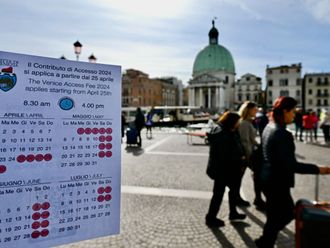Rome: Rome is planning a hotel tax on the 9 million visitors to the Eternal City each year, a revenue-raising measure that may hurt tourism in the Italian capital and put further pressure on its credit rating.
Prime Minister Silvio Berlusconi's government proposed the levy to reduce the 500 million euros (Dh2.19 million) it contributes annually to help Rome control 9.6 billion euros of debt. Italy authorised the initiative in its 24.9 billion-euro budget-cutting plan, prompting Standard & Poor's on May 27 to change the outlook on Rome to negative, saying the government was scaling back its commitment to bolster the city's finances.
Berlusconi was to discuss the tax of as much as 10 euros per night at a five-star hotel when he addresses a meeting of Federalberghi, Italy's largest hotel trade lobby, later yesterday in Rome. The city estimates the tax will raise about 100 million euros.
Cleaning up accounts
"I don't understand why everyone is so scandalised by something that is just going to help the city clean up its accounts, which are strongly penalised by the huge amount of visitors who weigh on our services," Maurizio Leo, Rome's top budget official, said on June 1 in emailed responses to questions.
Federalberghi is urging the government to drop the plan. Italian consumer group ADOC estimates the hotel tax will cut visitors to the city by about 5 per cent and reduce annual tourism revenue by 70 million euros.
Foreign visitors spent less time and money in Italy last year, according to Federalberghi. The average length of visits fell almost 3 per cent last year to 4.95 days and the average hotel expenditure dropped 7 per cent to 690 euros per trip. Tourists visiting Rome declined 3.5 per cent in 2009 to 8.86 million, according to data compiled by the Bank of Italy.
"Even if it only deters 1 per cent of visitors, the hotels and other businesses lose income and the balance of payments is worse off," said Ian Gamse, a director at London-based Otus & Co, which advises Marriott International Inc and Hilton Worldwide, in an interview.
Taxes would be assessed based on the number of stars assigned to the hotel. Of the city's almost 50,000 rooms, more than half are four or five stars, meaning those visitors would pay as much as 10 euros a night.
Luxury travellers
The expense would be "irrelevant for luxury travellers, while it may have a different impact on three-star hotels and low-budget tourists," said Luca Magni, Baglioni Hotels Group's head of branding and communications. Regina Hotel Baglioni, the company's only hotel in Rome, is a five-star hotel on the city's most famous street, Via Veneto.












